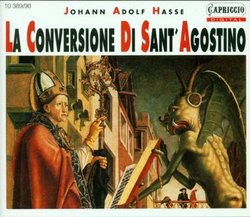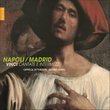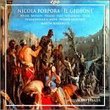| All Artists: Johann Adolf Hasse, Marcus Creed, Mechthild Georg, Berlin Akademie für Alte Musik, Rias-Kammerchor [members of], Robert Worle Title: Hasse: La Conversione di Sant' Agostino Members Wishing: 0 Total Copies: 0 Label: Capriccio Release Date: 4/8/2008 Album Type: Import Genre: Classical Styles: Opera & Classical Vocal, Historical Periods, Baroque (c.1600-1750) Number of Discs: 2 SwapaCD Credits: 2 |
Search - Johann Adolf Hasse, Marcus Creed, Mechthild Georg :: Hasse: La Conversione di Sant' Agostino
 | Johann Adolf Hasse, Marcus Creed, Mechthild Georg Hasse: La Conversione di Sant' Agostino Genre: Classical
|
Larger Image |
CD DetailsSimilar CDs |
CD ReviewsHasse and Creed make the best of an unbearable libretto Leslie Richford | Selsingen, Lower Saxony | 09/19/2008 (4 out of 5 stars) "Johann Adolf Hasse (1699 - 1783): La Conversione di Sant' Agostino [The Conversion of Saint Augustine]. Oratorio in two parts on a libretto by Electress Maria Antonia Walpurgis of Saxony. Performed by: Mechthild Georg (Monica); Axel Köhler (Alipio); Ralph Popken (Agostino); Robert Wörle (Simpliciano); Gotthold Schwarz (Navigio); Members of the RIAS Berlin Chamber Choir; Akademie für Alte Musik [Academy for Ancient Music] Berlin; conductor: Marcus Creed. Recorded in the Friedenskirche (Church of Peace) at Sanssouci, Potsdam, Germany from 6th to 9th May 1991. A co-production between RIAS Berlin and Capriccio. Published in 1993 as Capriccio 10 389/90. Total playing time: 103'53".
Johann Adolf Hasse is today probably one of the most neglected of the important German baroque composers. In his day, he was respected and famous, writing very successful operas and being appointed Kapellmeister at the Saxon court in Dresden instead of the long-suffering Jan Dismas Zelenka, whose works are possibly better-known 250 years later than those of the man who supplanted him. Surprisingly, it is Hasse's sacred works which seem to have won more attention than his operas, to judge by the results when searching for his music on Amazon. The "Conversion of St. Augustine" recorded here was first performed in 1750 and was written to a libretto by the wife of the Elector of Saxony. And it must be said that it is above all this libretto which robs the disc of its fifth star - it is, I suppose, a typically 18th century attempt at sincere Catholic piety, but on me, as a 21st century Protestant, it appears trite and shallow in the extreme. Basically, nothing much happens, except that Agostino goes on (and on and on and on) lamenting his sinful lusts and deploring his inability to turn to God, all the while "cheered on" from the sidelines by his mother Monica, her spiritual advisor Simpliciano, Agostino's friend Alipio and his brother Navigio. Towards the end, Agostino hears the famous voice from heaven, "Tolle, lege", and everybody is happy ever after. Apart from the hair-raising theological shortcomings of all this, it is the kind of inward-looking piety which was popular in the 18th century but is today rightly considered as psychologically off-the-wall - I nearly said "humbug". So, nobody would buy this for the libretto. But what did Hasse make of it? And what do the performers make of Hasse? Well, that is, fortunately, another story. The music is typically baroque, the composer using all his art to conjure up images to fit the emotional states of the text. The recording puts the singers very much in the foreground, but personally I found it rewarding to listen to the Berlin instrumentalists whose direct, lively, even sparkling way of playing their period instruments has enabled them to establish themselves with a vengeance, so to speak, in the European early music scene. The usual sequence of da capo arias and secco recitative is mastered well by the singers, who, although perhaps not all so well-known internationally, do a remarkably good job: I have been impressed again by the clarity of Mechthild Georg, the only female singer here, but also by the delightful timbres of the two countertenors Ralph Popken and Axel Köhler, both of whom probably deserve more recognition than they have actually received. Robert Wöhrle has a "beautiful" tenor, although I occasionally felt that perhaps there was more beauty than expressivity here. Gotthold Schwarz, bass, only has one aria which he masters well. The engineering is, as usual with these ensembles, as good as perfect, making this a recommendation for those who want to get to know Hasse or to listen in to what was going on in the German early music scene at the beginning of the 90's - but only for those who can bear the impossible Italian libretto (which is printed in full in the booklet with an excellent English translation and a very flowery German one, presumably taken from the original production)." |

 Track Listings (12) - Disc #1
Track Listings (12) - Disc #1



